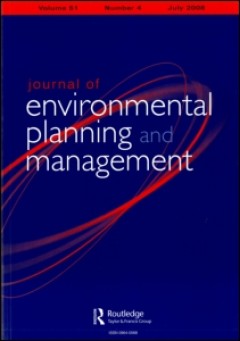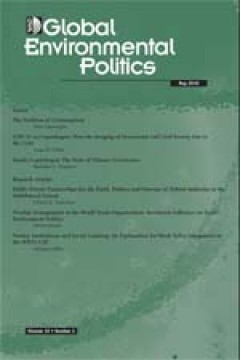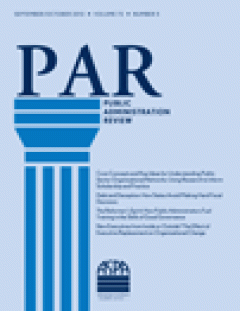Filter by

Studying the State through State Formation
This article seeks to take stock of the insights offered by the fast-growing literature on comparative state formation, which is treated here as a neglected offshoot of the “bringing the state back in” movement of the 1980s. Unlike previous Eurocentric reviews of this literature, this article includes works that range broadly in time and geography. The author focuses particularly on two areas o…
- Edition
- Vol. 62, No. 1 January 2010. pp. 148-175
- ISBN/ISSN
- 00438871
- Collation
- -
- Series Title
- WORLD POLITICS
- Call Number
- -

The Problem of Consumption
One of the biggest challenges for global environmental governance is “the problem of consumption.” The task involves far more than simply influencing what consumers choose, use, and discard. It requires a concerted effort to address the systemic drivers—including advertising, economic growth, technology, income inequality, corporations, population growth, and globalization—that shape the quanti…
- Edition
- Vol. 10, No. 2, May 2010, Pages 1-10
- ISBN/ISSN
- 15263800
- Collation
- -
- Series Title
- Global Environmental Politics
- Call Number
- -

COP-15 in Copenhagen: How the Merging of Movements Left Civil Society Out in …
What happened to non-governmental organizations' participation at the COP-15 round of climate negotiations in Copenhagen? Although the climate regime has been seen as relatively open to civil society, everything changed in Copenhagen and civil society became increasingly disenfranchised. This article discusses the three main forces that led to civil society's disenfranchisement at this round of…
- Edition
- Vol. 10, No. 2, May 2010, Pages 11-17
- ISBN/ISSN
- 15263800
- Collation
- -
- Series Title
- Global Environmental Politics
- Call Number
- -

Inside Copenhagen: The State of Climate Governance
This article clarifies the outcome of the Copenhagen climate conference from the perspective of a government delegate. Access behind closed doors reveals the full extent of the damage. The failure at Copenhagen was worse than our worstcase scenario but should not obscure a bigger and brighter picture. Aggregate climate governance is in healthy condition that contrasts with the plight of multila…
- Edition
- Vol. 10, No. 2, May 2010, Pages 18-24
- ISBN/ISSN
- 15263800
- Collation
- -
- Series Title
- Global Environmental Politics
- Call Number
- -

Public-Private Partnerships for the Earth: Politics and Patterns of Hybrid Au…
The article examines the politics and patterns of public-private partnerships for the environment in the multilateral system. It argues that two kinds of dynamics have contributed to the hybridization of environmental authority at the global level. On one hand, the fragmentation of environmental regimes and the parallel growth of non-state actors have resulted in structural pressures and opport…
- Edition
- Vol. 10, No. 2, May 2010, Pages 25-53
- ISBN/ISSN
- 15263800
- Collation
- -
- Series Title
- Global Environmental Politics
- Call Number
- -

Overlap Management in the World Trade Organization: Secretariat Influence on …
This article builds on recent scholarship that explores the nature of secretariat influence in global governance. By combining data from interviews with WTO delegates and secretariat staff with document analysis, this study examines how the WTO secretariat is shaping trade-environment politics by using its bureaucratic authority to influence overlap management in the WTO. This study argues that…
- Edition
- Vol. 10, No. 2, May 2010, Pages 54-79
- ISBN/ISSN
- 15263800
- Collation
- -
- Series Title
- Global Environmental Politics
- Call Number
- -

Norms, Institutions and Social Learning: An Explanation for Weak Policy Integ…
The United Nations Conference on Environment and Development (UNCED) recognized that sustainable development can only be actualized if environmental norms are integrated into other areas of policy across levels of governance. This article examines the Committee on Trade and Environment of the World Trade Organization (WTO) to answer the question of why actors' efforts to enhance the mutual supp…
- Edition
- Vol. 10, No. 2, May 2010, Pages 80-117
- ISBN/ISSN
- 15263800
- Collation
- -
- Series Title
- Global Environmental Politics
- Call Number
- -

Shifting Boundaries between the Public and Private Sectors: Implications from…
What are the differences between the public and private sectors as well as their interrelationships in light of the recent financial crisis? Has the global economic crisis fundamentally shifted the boundaries between the two sectors? This essay examines the nature and extent of the shift. The authors present an analysis of the Troubled Asset Relief Program (TARP) to highlight the massive transf…
- Edition
- Volume 70 Issue 3, May-June 2010. Pages 349 - 360
- ISBN/ISSN
- 00333352
- Collation
- -
- Series Title
- Public Administration Review
- Call Number
- -

Order Beyond Crisis: Organizing Considerations Across the Public Service Conf…
This article responds to the preceding paper by Stephanie Moulton and Charles Wise, critiquing the dimensions that those authors use as organizing guides in the delivery of public services through public–private institutional configurations, including the evaluation of the Troubled Asset Relief Program (TARP). In this essay, Eva M. Witesman proposes a modification to the framework and provides …
- Edition
- Volume 70 Issue 3, May-June 2010. Pages 361 - 366
- ISBN/ISSN
- 00333352
- Collation
- -
- Series Title
- Public Administration Review
- Call Number
- -

Evaluating Racial Disparities in Hurricane Katrina Relief Using Direct Traile…
Are charges of racial disparities in the Federal Emergency Management Agency's relief efforts in New Orleans following Hurricane Katrina accurate? Limited publicly available data on trailer distribution in New Orleans are compared to an on-site trailer count and to a complete trailer count from aerial photographs of New Orleans. The Lower Ninth Ward in Orleans Parish (98 percent Black prior to …
- Edition
- Volume 70 Issue 3, May-June 2010. Pages 367 - 377
- ISBN/ISSN
- 00333352
- Collation
- -
- Series Title
- Public Administration Review
- Call Number
- -

The Essence of the "Market Army"
Western armies have undergone substantial organizational-cultural transformations since the end of the Cold War. Two main themes have been suggested to describe these transformations: postmodernity and post-Fordism. This article analyzes these profound shifts. The author portrays the new Western army as a "market army," distancing itself from the "citizen army," and envisions a continuum betwee…
- Edition
- Volume 70 Issue 3, May-June 2010. Pages 378 - 389
- ISBN/ISSN
- 00333352
- Collation
- -
- Series Title
- Public Administration Review
- Call Number
- -

The Role of Informal Institutions in U.S. Immigration Policy: The Case of Ill…
Immigration is a sensitive topic on the American political, social, and economic agenda. Globalization as well as the end of the Cold War have meant that people are on the move worldwide as never before. Millions of people from poor countries migrate to richer ones to provide better lives for themselves and their families through legal and illegal channels. Heated debates surround this subject.…
- Edition
- Volume 70 Issue 3, May-June 2010. Pages 390 - 400
- ISBN/ISSN
- 00333352
- Collation
- -
- Series Title
- Public Administration Review
- Call Number
- -

Recipes for Pork and Other Delicious Offerings for the New Administration
Is pork produced by feeble budgetary processes? By fixing weak budgetary procedures, can wasteful spending and opportunities for corruption be reduced? This essay looks at three varieties of pork: earmarked, ad hoc, and presidential. What can be done to curb the excesses of each one? By examining the problem of congressional earmarking, this timely article proposes a new process for controlling…
- Edition
- Volume 70 Issue 3, mAY-jUNE 2010. Pages 401 - 411
- ISBN/ISSN
- 00333352
- Collation
- -
- Series Title
- Public Administration Review
- Call Number
- -

Civil Rights, Federalism, and the Administrative Process: Favorable Outcomes …
Some theorists argue that cooperative intergovernmental relations are critical to policy implementation in the United States. This assertion is explored in the context of fair housing enforcement by comparing favorable administrative outcomes in fair housing complaints at the federal, state, and local levels from 1989 to 2004. What conclusions can be drawn from this systematic comparison of int…
- Edition
- Volume 70 Issue 3, May-June 2010. Pages 412 - 421
- ISBN/ISSN
- 00333352
- Collation
- -
- Series Title
- Public Administration Review
- Call Number
- -

Averting Environmental Justice Claims? The Role of Environmental Management S…
Today, more regulatory provisions are in place for protecting low-income minority populations who shoulder a disproportionate amount of environmental risk. Recognized as communities of "environmental justice," industrial facilities located within these areas bear greater legal liabilities for and societal scrutiny of their environmental impacts. The authors offer compelling evidence that, in an…
- Edition
- Volume 70 Issue 3, May-June 2010. Pages 422 - 433
- ISBN/ISSN
- 00333352
- Collation
- -
- Series Title
- Public Administration Review
- Call Number
- -

Bill Gibson and the Art of Leading Across Boundaries
As director of a regional council for more than 30 years, Bill Gibson is instrumental in facilitating "boundary-crossing" collaborations that increase public value. This Administrative Profile examines three cases of regional, cross-sector collaboration catalyzed by Gibson's leadership. Characteristics of entrepreneurship, attention to "relationship capital," and the humility derived from ego s…
- Edition
- Volume 70 Issue 3, May-June 2010. Pages 434 - 442
- ISBN/ISSN
- 00333352
- Collation
- -
- Series Title
- Public Administration Review
- Call Number
- -

Capacity, Leadership, and Organizational Performance: Testing the Black Box M…
According to recent "black box" models of public management, managerial capacity is a critical component for achieving service delivery improvement. In particular, black box models assume that the impact of management systems is maximized through integration with effective leadership. This assumption is tested by analyzing the effects of managerial capacity and organizational leadership on the …
- Edition
- Volume 70 Issue 3, May-June 2010. Pages 443 - 454
- ISBN/ISSN
- 00333352
- Collation
- -
- Series Title
- Public Administration Review
- Call Number
- -

What Do Bureaucrats Like Doing? Bureaucratic Preferences in Response to Insti…
How do bureaucrats respond to administrative reform in relation to their overall administrative goals? The authors test the bureau-shaping thesis, which holds that bureaucrats' preferences for certain kinds of roles and tasks motivate their support for bureau reform. Drawing on attitudinal and behavioral data from a survey of English local government officials, the findings underscore how burea…
- Edition
- Volume 70 Issue 3, May-June 2010. Pages 455 - 463
- ISBN/ISSN
- 00333352
- Collation
- -
- Series Title
- Public Administration Review
- Call Number
- -

Incrementalism in Appropriations: Small Aggregation, Big Changes
U.S. federal budget dynamics, as a major attribute of the legislative and bureaucratic decision-making processes, increasingly calls into question the scholarly focus on incrementalism. What constitutes a "small" change is largely unspecified in previous research that has also been unable to assess incrementalism across multiple levels of aggregation. Using a unique budgetary database, this art…
- Edition
- Volume 70 Issue 3, May-June. Pages 464 - 474
- ISBN/ISSN
- 00333352
- Collation
- -
- Series Title
- Public Administration Review
- Call Number
- -

Public–Private Partnerships and the Public Accountability Question
Public–private partnerships (PPPs) are growing in popularity as a governing model for delivery of public goods and services. PPPs have existed since the Roman Empire, but their expansion into traditional public projects today raises serious questions about public accountability. This article examines public accountability and its application to government and private firms involved in PPPs. An …
- Edition
- Volume 70 Issue 3, May-June 2010. Pages 475 - 484
- ISBN/ISSN
- 00333352
- Collation
- -
- Series Title
- Public Administration Review
- Call Number
- -
 Computer Science, Information & General Works
Computer Science, Information & General Works  Philosophy & Psychology
Philosophy & Psychology  Religion
Religion  Social Sciences
Social Sciences  Language
Language  Pure Science
Pure Science  Applied Sciences
Applied Sciences  Art & Recreation
Art & Recreation  Literature
Literature  History & Geography
History & Geography